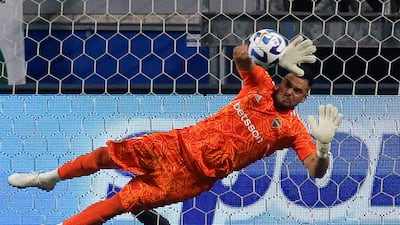On an autumn night at Old Trafford eight years ago, Manchester United found themselves nervously facing a tricky League Cup tie against opposition from England’s North East. Middlesbrough, of the second-tier Championship, proved plucky and held out for a 0-0 draw after extra time.
The penalty shoot-out then went badly for the home side, three of United’s senior England internationals failing with their spot-kicks. United’s goalkeeper that night, Argentina’s No 1 at the time, Sergio Romero, saw three Boro penalties zip past him.
Can that be the same “Chiquito” Romero, as he is known in his native land, who this weekend goes to the Copa Libertadores final at Rio de Janeiro’s Maracana Stadium with a good chance of being named the competition’s most valuable player in large part because of his eerily successful record stopping penalties? It is.
Thanks to Romero’s excellence, Boca Juniors have reached their 12th final of the Libertadores – South America’s equivalent of the Champions League – where they meet Brazil’s Fluminense, with the victor booking a ticket to next month's Club World Cup in Saudi Arabia.
Romero’s agility and anticipation in tie-breakers has been remarkable, a charmed solution each time Boca fail to break a knockout-round deadlock. They have needed him, given their habit of grinding out 0-0 draws in first legs.
Against Nacional of Uruguay at the last-16 stage, Romero kept out two spot-kicks after the sides shared four goals in open play in the second leg. Against compatriots Racing, Romero saved another pair of penalties in the quarter-final shoot-out. Come the semi-final’s decisive away leg at Brazil’s Palmeiras, it was déjà-vu: two spot-kicks saved by Romero to put Boca within reach of the club’s seventh Libertadores title, their first since 2007.
There’s evidence the Romero knack with penalties has become an aura. Boca’s progress in the domestic Cup, the Copa Argentina, has lately featured more shoot-out saves from the much-travelled gloveman and, in the last round, he watched a pair of penalty-takers from Talleres overawed and miss the target entirely. Romero’s record is intimidating: Since joining Boca from Italy’s Venezia last year, he has faced 26 penalties. Only 12 have been converted.
Proof then that, between the posts more than in any other role, age is no impediment to improvement. Romero is 36, but he’ll be much the younger of the keepers involved in a final that leans heavily on its veterans. In goal for Fluminense will be 43-year-old Fabio, who, like Romero, finds himself on the cusp of the most significant medal of a long club career in middle age.
Romero, who earned 96 caps for Argentina up until stepping away from national duty in 2018, previously peaked in terms of trophies with the 2017 Europa League. That was a rare night in the starting XI at United, where he spent six seasons understudying David de Gea.
Perhaps he would have added a second Europa League had he been able to play in the 2021 final, where, in the deciding shoot-out, De Gea made no saves and missed the last spot-kick of an elongated penalty duel, won 11-10 by Villarreal.

The scorer of United’s open-play goal that evening was Edinson Cavani, who will lead the line at the Maracana for Boca and who, like his contemporary Romero, has returned to South America after stints in Italy, France and England.
But for suspension, another United ex, defender Marcos Rojo, would be lining up in Boca’s defence. Rojo, 33, remains untamed: he collected the 10th red card of his club career in the semi-final against Palmeiras.
Equally untamed is Marcelo, the former Real Madrid captain, who, after five Champions League titles and 15 Madrid years redefining the position of left-back as a role principally geared to attack, rejoined Fluminense earlier this year.
"Flu" is the club where Marcelo first enrolled as a 13-year-old. He’s now 35, but still an exuberant ally for his head coach Fernando Diniz, whose brand of high-risk, attacking football is burnishing his reputation.
The final is a big test for Diniz. He is currently sharing his club role with the job of interim Brazil coach, on the assumption that Carlo Ancelotti will take up the Brazil position when the Italian’s contract at Real Madrid expires in June.
But the success of Diniz in guiding "Flu" to only their second Libertadores final – they were silver medallists in 2008 – has gained him loud backing to be appointed in charge of the national squad full-time.
Romario, the former Fluminense, Barcelona and World Cup-winning striker and now a senior politician in Brazil, told Globo TV the Ancelotti plan should be ditched and Diniz made permanent national coach.
“He’s the best manager in Brazil,” said Romario. “Forget Ancelotti. I want Diniz there all the way. He’s shown at Flu his ability to bring players together. They deserve to win this final.”


